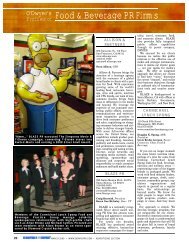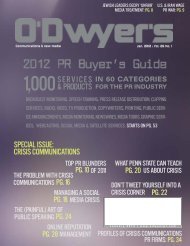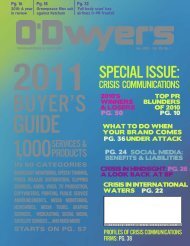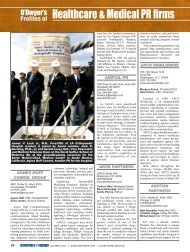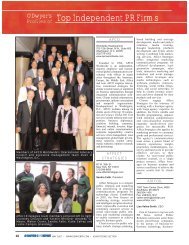PR Firm Rankings - Odwyerpr.com
PR Firm Rankings - Odwyerpr.com
PR Firm Rankings - Odwyerpr.com
Create successful ePaper yourself
Turn your PDF publications into a flip-book with our unique Google optimized e-Paper software.
FEATURE<br />
Seconds count in online reputation management<br />
By Blake Cahill<br />
News travels fast these days. A<br />
YouTube video can birth its own<br />
Internet meme within days of<br />
being posted — and fade away just as<br />
quickly. A single tweet can reach thousands<br />
in seconds, and with a current average<br />
of 600 tweets a second (as of<br />
February), historically huge amounts of<br />
information and opinion are now being<br />
exchanged online at an incredible rate<br />
With consumers on a constant stream<br />
of updates, it’s very easy for a negative<br />
story to grow legs and run away.<br />
Seconds matter when it <strong>com</strong>es to noticing<br />
— and then reacting to — online<br />
sentiments that affect your brand. This<br />
means <strong>com</strong>panies and individuals must<br />
be more aggressive than ever when it<br />
<strong>com</strong>es to online reputation management.<br />
Google has played up this “seconds<br />
matter” idea with some of its more<br />
recent search developments. In<br />
December, the search giant added realtime<br />
search features, which show live<br />
updates from news and social media<br />
sites on users’ results pages. Users can<br />
even whittle down their search options<br />
to just these by-the-second updates by<br />
selecting “Latest” from the search<br />
options menu. If there is enough buzz<br />
around the topic, the latest will show a<br />
full page of up-to-the-minute blog<br />
posts, tweets and other social content.<br />
Search results can also be filtered to<br />
show only the latest “updates” from<br />
micro-blogs like Twitter and<br />
FriendFeed. Along with its real-time<br />
search launch, Google added “hot topics”<br />
— showing the most <strong>com</strong>mon subjects<br />
in real-time web publishing — to<br />
Google Trends.<br />
These real-time updates only add to<br />
the already lightning-fast results users<br />
can get from Google’s Suggest tool.<br />
Suggest is a less recent development<br />
than real-time search, but many <strong>com</strong>panies<br />
are still under-estimating its potential<br />
impact on their brand’s reputation.<br />
Because Suggest, as its name implies,<br />
suggests terms while a user is typing in<br />
the search bar, users are shown relevant<br />
and related topics before they can even<br />
write a <strong>com</strong>plete word. This near-psychic<br />
tool is great if the most relevant<br />
search terms for your brand are “brand<br />
X wins award” or “where can I buy<br />
brand X.” But if your brand is suffering<br />
from negative buzz, Suggest makes it<br />
even harder to downplay bad news. The<br />
tides of online sentiment can quickly<br />
turn searchers — even those with the<br />
best of intentions — against you. For<br />
example, I might be interested in buying<br />
a Toyota, but when I type “Toyota” into<br />
my Google search bar, the word “recall”<br />
shows up in three different suggestions<br />
— guess I’ll rethink that purchase.<br />
Tools like this make it so much easier,<br />
and faster, for consumers to find<br />
good and bad brand <strong>PR</strong> online. The<br />
question for <strong>PR</strong> pros now is how to<br />
make sure that information remains<br />
positive.<br />
The first step is to get to know these<br />
search tools. How do they work, and<br />
how can you use them to your advantage<br />
The same things that can make it<br />
harder for you to manage your brand —<br />
the speed and the suggestive power —<br />
can make it easier for you to monitor<br />
your brand and <strong>com</strong>petitors. Just by typing<br />
half of your <strong>com</strong>pany’s name into a<br />
search bar, you can see what people are<br />
saying about it online and what other<br />
products, people or news it’s being<br />
associated with. This means you can<br />
know about potential <strong>PR</strong> problems<br />
almost as soon as they start.<br />
Having access to such a rapid feed of<br />
information puts the responsibility on<br />
you to react quickly if a crisis emerges.<br />
If everyone else knows that director<br />
Kevin Smith is mad at you for kicking<br />
him off a flight, as happened to<br />
Southwest Airlines a couple of weeks<br />
ago, you have to be ready with an apology<br />
and a <strong>PR</strong> plan of action.<br />
Waiting until the news is old (which, in<br />
Twitter time, is about two days, tops)<br />
makes your <strong>com</strong>pany look out-of-touch or<br />
worse, that it doesn’t care about its customers.<br />
Even if your initial monitoring results<br />
are good, you can’t rest on your laurels.<br />
Brand perception can always improve.<br />
Start by participating in the same social<br />
networks that are feeding your brand’s<br />
buzz. Enthusiasts will appreciate the<br />
recognition and possibly build you up<br />
even more, and detractors may just<br />
change their minds — as long as you are<br />
authentic, offer relevant information, and<br />
are sincere about hearing them out.<br />
Your <strong>PR</strong> team can also boost your<br />
search results by reaching out to “authorities,”<br />
from the New York Times to certain<br />
bloggers, if what they offer is relevant to<br />
your product and your audience. Of<br />
course, no self-respecting authority will<br />
write a puff piece just<br />
because you ask them<br />
to. Interact with them<br />
on their terms, and<br />
offer something that<br />
is useful to their<br />
brand. Step in as an<br />
expert source, remain<br />
open to interview<br />
requests, and interact<br />
one-on-one with Blake Cahill<br />
influential social networkers.<br />
The more you can tie positive<br />
mentions of your brand to a high-authority<br />
source, the more likely it is that the<br />
casual searcher will be exposed to brandpositive<br />
search results. And the more that<br />
good buzz gets around, the more likely it<br />
is to be searched, and thus suggested as a<br />
future search term.<br />
The more good news you have out<br />
there, the less-prominent bad news<br />
be<strong>com</strong>es, provided that you’re optimizing<br />
that good news to show up in organic<br />
search. Aside from tapping vibrant social<br />
“Waiting until the news is old (which, in Twitter time, is about two days, tops) makes<br />
your <strong>com</strong>pany look out-of-touch or worse, that it doesn’t care about its customers.”<br />
networks and authorities, you can further<br />
boost your brand name in search by riding<br />
the news cycle. Keep your positive<br />
search results fresh by regularly pushing<br />
out new stories through traditional publications<br />
and social networks. The fresher<br />
it is, the more likely it is to show up on<br />
that first page in the “Latest” results from<br />
the social web. This doesn’t mean you<br />
should spam; as the old adage goes, if<br />
you have nothing good to say, don’t say<br />
it.<br />
Brand management has gotten more<br />
<strong>com</strong>plicated in today’s faster, louder,<br />
multi-channel world. Fortunately, the<br />
same tools that allow consumers to spread<br />
information and opinions so quickly can<br />
work to a savvy <strong>PR</strong> team’s advantage. All<br />
it takes is vigilance, listening skills, and<br />
authentic, timely engagement with the<br />
right online outlets. Seconds count in this<br />
world — use them wisely.<br />
Blake Cahill is Senior Vice President of<br />
Marketing at Visible Technologies in<br />
Bellevue, WA. <br />
20<br />
MAY 2010 WWW.ODWYER<strong>PR</strong>.COM



